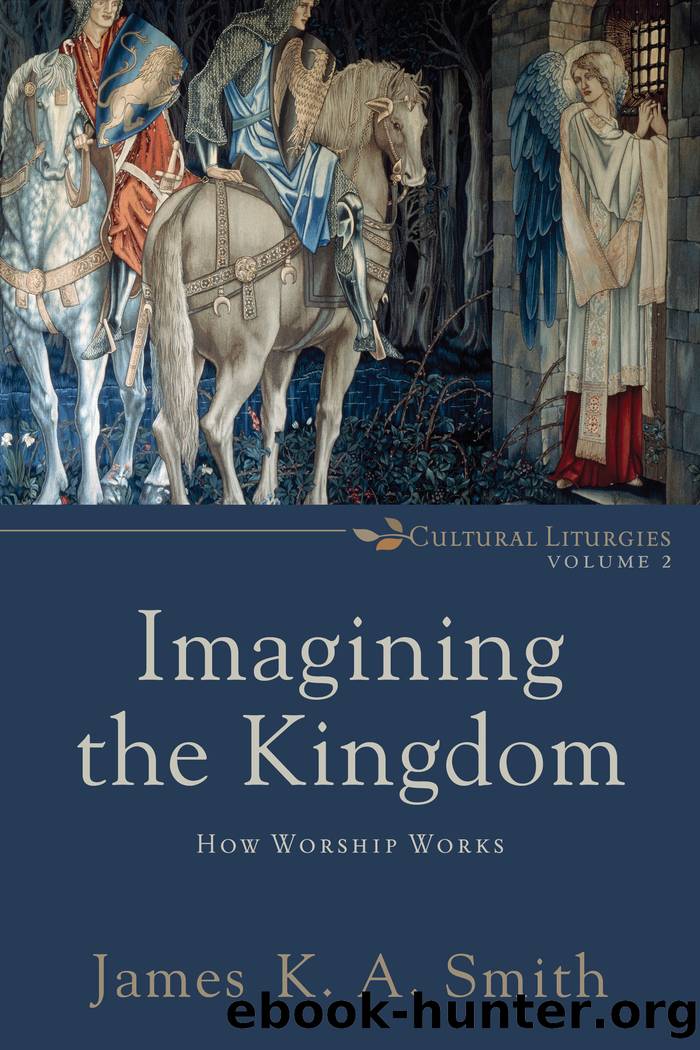Imagining the Kingdom (Cultural Liturgies) by Smith James K. A.;

Author:Smith, James K. A.; [Smith, James K.A.]
Language: eng
Format: epub, pdf
Tags: REL067000, REL051000, REL055020, Worship, Liturgics, Liturgy and the arts, Imagination, Philosophical anthropology
ISBN: 9781441240538
Publisher: Baker Publishing Group
Published: 2016-02-09T00:00:00+00:00
* * *
Johnson gives us some resources to see anew whatâs at workâand at stakeâin âliturgicalâ formations (which include both the sorts of âsecularâ liturgies Iâve analyzed in Desiring the Kingdom and Christian liturgical formation).[187] On one level, meaningful liturgies will recruit and employ primary metaphors precisely because we are embodied actors. Any practices that are going to be âinhabitableâ by us will have to honor the embodied ways that we interact with our environment. Insofar as such liturgies create âworldsâ for us, they will have to be worlds cut to the measure of our meaty existence. Because we first and foremost mean the world as incarnate actors, any meaningful liturgy is going to âactivate,â as it were, some of our primary metaphorical orientations: touch will resonate with INTIMACY IS CLOSENESS; rhythms of movement will activate our sense that PURPOSES ARE DESTINATIONS; the presentation of narratives will find tangible ways to build on our primary metaphorical sense that TIME IS MOTION; and so forth. Rather than trafficking in abstract concepts that descend from on high, meaning-full liturgies that âmake senseâ for us on this deep, aesthetic, metaphorical level successfully meet us in our embodiment and build upon the praktognosia we carry in our bones.
On another level, such liturgiesâinsofar as they offer opportunity for ârepeated co-activation of neural patternsââwill constitute part of our âenvironmentâ and thus will build on primary metaphors in order to habituate us to conceptual metaphors that will then seep into our background and shape how we (nonconsciously) intend and constitute the world. In other words, such liturgies are not simply meaningful in themselves; they also become funds of meaning as âhorizons of expectationâ that then govern and condition the way we constitute the âextra-liturgicalâ world, as it were. Just as we âcannot avoid acquiring these [primary] metaphorsâ because they are the oxygen of our mundane experienceââactivated automatically and unconsciously to structure our understanding of situations and eventsâ (MB 178)âso too the conceptual metaphors that are âcarriedâ in liturgical practices will, over time, sediment into our background in ways that are more aesthetic than logical, more poetic than didactic. Carried in such practices will be conceptual metaphors that prime us to immediately see God, the world, and others in certain ways. These will not be conscious judgments we make but rather our primary perception of the world that is already evaluative. Different operative metaphors give us a very different worldâand different callings within it. There will be secular liturgies, for example, that find their metaphorical power and center in a picture of egocentricity: they will functionally tell the story that I am the center of the universe; that the worldâand perhaps even Godâexists for my pleasure; that ânatureâ is a fund of resources available for my use and disposal; that there is a kind of centripetal force tending toward me at the center. There are primary metaphors that can reinforce this take on the world. Indeed, the very fact that I can only ever experience my experience is a powerful embodiment that has a centripetal feel to it.
Download
Imagining the Kingdom (Cultural Liturgies) by Smith James K. A.;.pdf
This site does not store any files on its server. We only index and link to content provided by other sites. Please contact the content providers to delete copyright contents if any and email us, we'll remove relevant links or contents immediately.
The Lost Art of Listening by Michael P. Nichols(7163)
Why I Am Not A Calvinist by Dr. Peter S. Ruckman(4045)
The Rosicrucians by Christopher McIntosh(3371)
Wicca: a guide for the solitary practitioner by Scott Cunningham(3040)
Signature in the Cell: DNA and the Evidence for Intelligent Design by Stephen C. Meyer(2877)
Real Sex by Lauren F. Winner(2864)
The Holy Spirit by Billy Graham(2775)
To Light a Sacred Flame by Silver RavenWolf(2674)
The End of Faith by Sam Harris(2632)
The Gnostic Gospels by Pagels Elaine(2397)
Waking Up by Sam Harris(2330)
Nine Parts of Desire by Geraldine Brooks(2280)
Jesus by Paul Johnson(2226)
Devil, The by Almond Philip C(2204)
The God delusion by Richard Dawkins(2187)
Heavens on Earth by Michael Shermer(2187)
Kundalini by Gopi Krishna(2091)
Chosen by God by R. C. Sproul(2054)
The Nature of Consciousness by Rupert Spira(1980)
